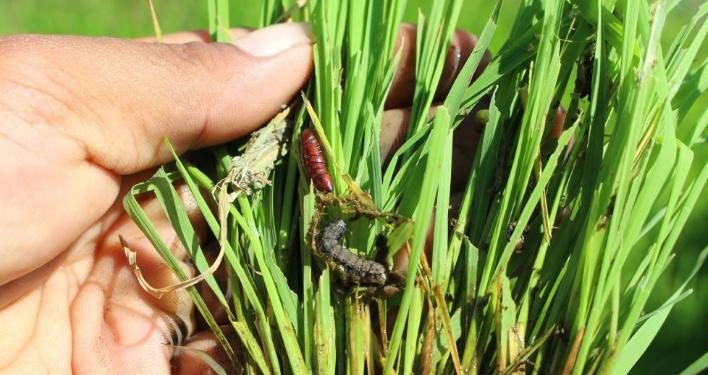CABI has joined forces with the Philippine Rice Research Institute (PRRI) to assess the impact of the fall armyworm (Spodoptera frugiperda) pest at over 20 sites where rice crops are grown in the Philippines.
The fall armyworm is a lepidopteran pest native to the Americas that feeds in large numbers on leaves and stems of more than 80 plant species, causing major damage to maize, sorghum, sugarcane but also rice, cotton and other vegetable crops.
Scientists from CABI’s East & South East Asia Regional Centre have been working to develop a location-specific ecologically-based integrated fall armyworm pest management strategy to help make sure the country is ready for any future invasions of the pest, especially focused on rice.
Rice is essential to the Philippines’ food security and its economy. Each year, the country produces over 11 million metric tonnes of rice, making it the seventh-largest rice producer in the world.
But a recent global invasion and seasonal migration of the fall armyworm has threatened crop production and the food security of millions across Asia.
The pest is transboundary and was first detected in Africa in 2016. Since then, it has invaded countries in South and South East Asia. In the Philippines, fall armyworm was first reported to be damaging corn in 2019.
DNA Barcoding studies by CABI revealed the existence of two strains – the Corn strain (C-strain) and the Rice strain (R-strain). It became evident that both strains damage corn.
In 2021, fall armyworm spread and extended its host range to rice. In the USA, rice is the fall armyworm’s key host and substantial information is available on its pest status. However, little is known about the biotic and abiotic factors causing the invasion of it in rice in the Philippines.
To prevent the impacts of fall armyworm on the Philippines’ key food security crop and counteract any level of invasions on rice, it is important to understand the dynamics of the fall armyworm within rice ecosystems.
This helps ensure that appropriate mitigation measures seek to provide early warning and preparedness against any outbreaks in the country.
As part of a project funded by the Philippines Department of Agriculture and its Bureau of Agricultural Research, CABI assisted the Philippines, a Member Country of CABI, in conducting population and damage assessments of fall armyworm at over 20 sites.
These assessments helped to identify risk factors to explain the spread of fall armyworm, its damage and yield losses. Continuous monitoring is ongoing as well as vegetation analysis.
Dr Muhammad Faheem, CABI’s Integrated Crop Management Advisor and Project Manager, said, “The diversity of naturally occurring beneficial organisms in rice- and non-rice habitats, and the role of natural regulating agents have been determined, while studies on alternate host plants of fall armyworm in rice- and non-rice habitats, and host-plant specificity tests have been completed.
“CABI has also assisted in developing location-specific, nature-based solutions, developed decision guides and identified some key natural enemies, including new parasitoids.
“Future plans will include piloting and field-testing location-specific nature-based integrated solutions for fall armyworm management and developing specific decision guides for extension agents for field implementation and communication to farmers.”
Back in July 2023, a Pest Alert was issued for the fall armyworm in the Philippines and was placed on the Rice Handout Series on the PINOYRICE Knowledge Bank.
The Pest Alert was disseminated throughout the Philippines so smallholder rice farmers can also identify, monitor and implement management practices on time and reduce losses to the rice crop.
It was prepared by the Department of Agriculture – Philippine Rice Research Institute (DA-PhilRice), the Department of Agriculture – Bureau of Agricultural Research (DA-BAR), Philippines in collaboration with CABI’s East & South East Asia Regional Centre, Malaysia. BAR is CABI’s National Implementation Agency where its Liaison Officer is based.
CABI is a technical advisor to the DA-PhilRice in conducting research on fall armyworm invasion in rice and rice-based farming systems and develop adequate early preparedness and mitigation measures to counter its incursions in rice – a staple crop in the Philippines and Asia.
Since its first appearance in West Africa in 2016, CABI has been taking action against fall armyworm through our key programmes and projects specifically targeting the pest.
Error




